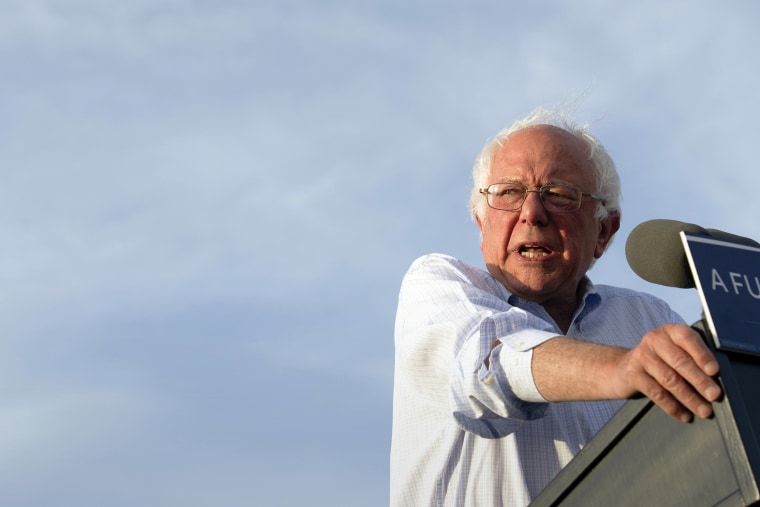As those watching the Democratic presidential race have no doubt heard, one of the most recent points of contention has to do with a 2018 conversation between Sens. Bernie Sanders (I-Vt.) and Elizabeth Warren (D-Mass.). At the risk of oversimplifying matters, Warren said she and Sanders disagreed in their private chat about whether a woman could win a presidential election.
The Vermont senator denies having made the comments, and last night in Wisconsin, Donald Trump took the time to side with Sanders.
President Donald Trump weighed in Tuesday night on the feud between Democratic presidential candidates Sen. Bernie Sanders, I-Vt., and Sen. Elizabeth Warren, D-Mass., telling supporters at a campaign rally here that he did not believe that Sanders had said that a woman could not win the 2020 presidential election."I don't believe that he said this," Trump said, referring to reports that during a private conversation in 2018 Sanders told Warren he did not think a woman could win in 2020 — a statement the Sanders campaign has denied."I don't know him, I don't particularly like him, he's a nasty guy," Trump continued, while defending Sanders and arguing "it's just not the kind of a thing he'd say."
Because Donald Trump knows "the kind of things" Bernie Sanders might tell Elizabeth Warren in a private conversation?
A few hours earlier, House Minority Leader Kevin McCarthy (R-Calif.), a close White House ally, spoke at a Capitol Hill press conference and, unprompted, started talking about the existence of Democratic superdelegates -- which McCarthy described as "horrific" -- before accusing House Speaker Nancy Pelosi (D-Calif.) of delaying the president's Senate impeachment trial in order to somehow "hurt" Bernie Sanders.
McCarthy added that former Vice President Joe Biden should stop campaigning during Trump's impeachment trial -- out of deference to Sanders, who'll be tied up at the trial. (McCarthy made no mention of the other senators who'll also be taken off the campaign trail during the trial.)
All of this may seem bizarre -- and to a very real extent, it is -- but it's not accidental. There's a GOP strategy unfolding, and it's based on a couple of assumptions.
First, Trump and McCarthy seem to believe Sanders' supporters can be manipulated -- a belief I suspect the Vermonter's backers will find insulting -- and intra-party divisions in Democratic politics can be stoked to ensure Trump's re-election. McCarthy's reference to superdelegates was especially notable: some Sanders supporters are under the mistaken belief that Democratic superdelegates derailed the senator's 2016 candidacy, which is not what happened.
Second, Republican attempts at mischief notwithstanding, the New York Times reports that Donald Trump's political advisers see Bernie Sanders as "their ideal" general-election opponent. To that end, the article added, members of the president's team "have been doing what they can to elevate [the independent senator's] profile and bolster his chances of winning the Iowa caucuses."
Which, naturally, helps explain why the president sided with Sanders last night, and why McCarthy seemed so focused on helping Sanders yesterday afternoon.
It's likely that many Democratic primary and caucus voters will look past these tactics, which is just as well. But as these efforts intensify, at least we'll know the motivation behind them.
Postscript: It's worth emphasizing, in case this isn't obvious, that Team Trump may see Sanders as their "ideal" 2020 foe, but Republicans may very well be wrong. Plenty of Democrats saw Donald Trump as the weakest GOP candidate four years ago, and we now know those assumptions didn't work out especially well.
